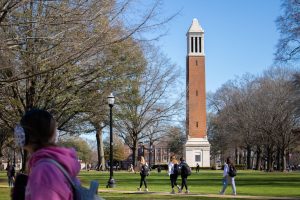UA’s current housing policy does not look out for the best interests of all students
September 17, 2019
A quick look at the UA website shows a wide range of the national recognition the school has received over the years. Of the 6,663 freshman in Fall 2018, 40% recorded an ACT score of 30 or higher. The freshman class also brought 187 new National Merit Scholars to campus, bringing the overall enrollment of these talented students to over 600. The University of Alabama has been very successful in recruiting talented students both in and out of state due to its shining record and impressive list of amenities. One of the promises made to freshmen is guaranteed housing. The University ensures that every freshman has a place to live, requiring all freshmen to spend their first year living on campus. This is something that reduces stress on both students and parents. The application process for college is already strenuous enough, so the guarantee of a place to live alleviates any worries on the subject. The issue with this policy, though, is that once freshman year is completed, housing is not a guarantee. The stress freshmen once experienced regarding housing can come back in waves.
According to U.S. News, 76% of UA students live off campus. The 24% that does reside on campus or in campus-affiliated housing is comprised largely of freshman, who again are required to do so. Of the 16 residence halls listed on the University’s website, only one, Bryce Lawn, is designated for transfer, returning and graduate students. This means that freshmen will be found in every other dorm. Returning students wishing to live on campus for another year want the community atmosphere of a freshman dorm, but reserved for upperclassmen. Because this is only an option for one residence hall, many students opt to live off campus after freshman year if able. There are options for dorm living after freshman year, such as applying to be an RA, but there are issues with this as well. For sorority women, RA training usually takes place during Fall Primary Recruitment. Thus, sorority women are forced to choose between RA training, a mandatory aspect of being an RA and participating in recruitment. For women involved in leadership positions in their Greek house, missing recruitment is not an option, so becoming an RA and living on campus is not an option.
Many students are unable to feasibly live off campus. Although not true in every case, on-campus living can be the option that makes the most financial sense. For those that must return to on-campus living, the housing application does not open until December. Since housing is not a guarantee for upperclassmen, there is a chance that the returning students needing to live on campus will not receive housing. At that point, off-campus living is out of the picture due to the time frame. Off-campus living is very competitive, and most leases within walking distance of campus have been signed by the time the housing application for returning students opens, much less when they hear back about housing assignments. This situation leaves students with their hands tied. The discrepancy between the freshman and upperclassmen housing policy is scary. The University gives the promise of housing to its freshman, but returning students often fall to the side. The current system does not look for the best interests of all students, which should be a main priority of any university.










